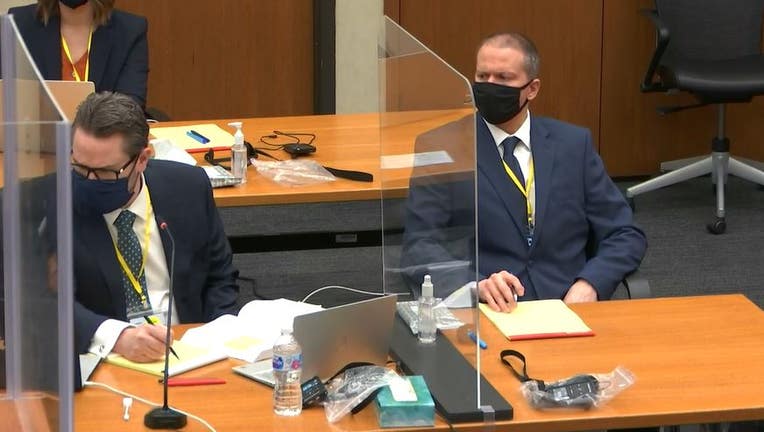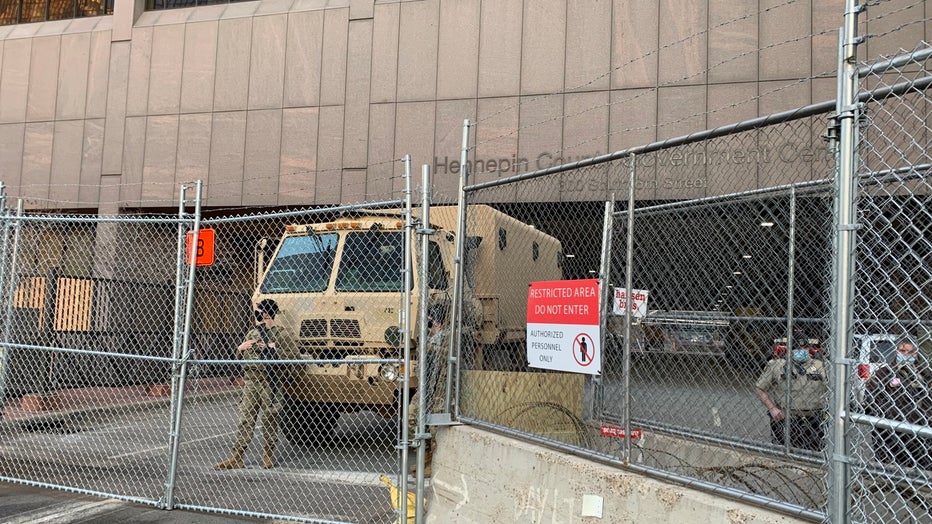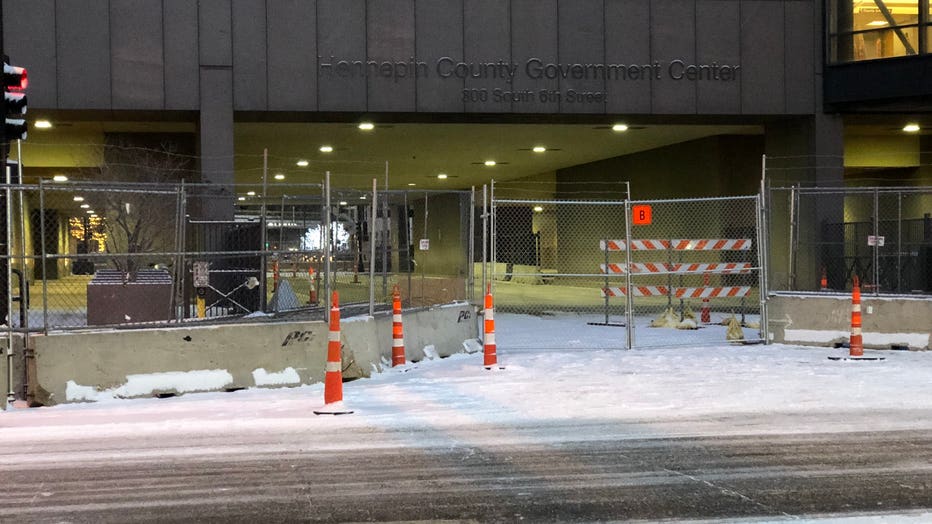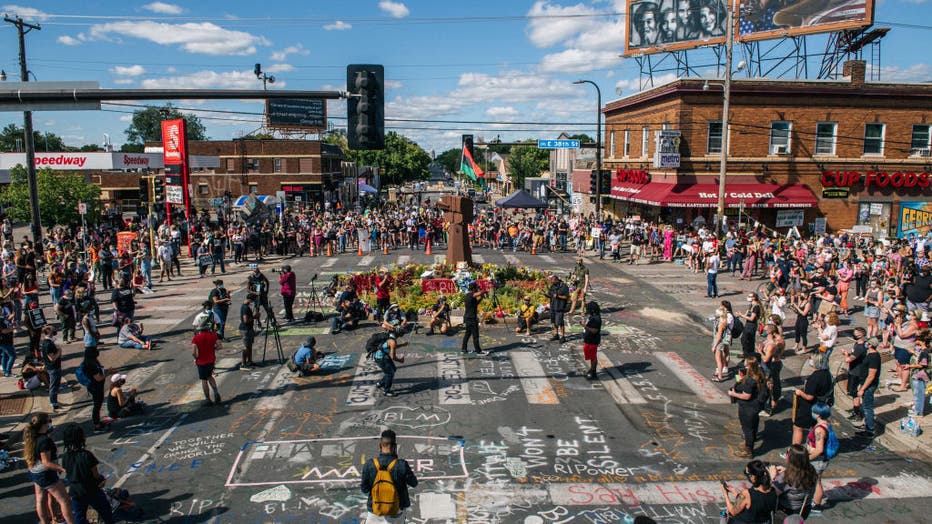Derek Chauvin trial jury selection delayed, court adjourns after day 1

Derek Chauvin (right) and attorney Eric Nelson (left) in the courtroom on Day 1 of jury selection in the trial for the death of George Floyd.
MINNEAPOLIS (FOX 9) - Judge Peter Cahill adjourned court just before 3 p.m. Monday in the first day of jury selection in the trial of former Minneapolis Police Officer Derek Chauvin.
Monday, Cahill sent the pool of potential jurors home for the day as court went into recess for a second time in the opening hour of Day 1. Prosecutors want to ask the Court of Appeals if the court can continue with jury selection and motions while a petition to the Minnesota Supreme Court on a third-degree murder charge in the case is pending. But Cahill said they may not get an answer from the court until tomorrow.
Chauvin’s attorney, Eric Nelson, told the court he intends to file a petition for the Minnesota Supreme Court to review the Court of Appeals opinion that came in late last week.
During a mid-morning recess, the prosecution filed a motion with the Court of Appeals to stop the trial from proceeding until the district court regains full jurisdiction over the case. The motion from the prosecution seeks a delay of the proceedings until the issue of a third-degree murder charge is settled to prevent any potential issues with the integrity of the case.
"There is no need for this kind of uncertainty in any case, let alone a case of this magnitude," the motion stated.
Derek Chauvin charges
The Minnesota Court of Appeals ruled on Friday that Cahill must reconsider reinstating the third-degree murder charge against Chauvin.
Chauvin is charged with second-degree murder and manslaughter for his role in George Floyd’s death last May. He was initially charged with third-degree murder as well, but Cahill dismissed the charge last October, saying it did not apply to this case.
The prosecution decided to push back on the third-degree murder charge after the Court of Appeals upheld the third-degree murder conviction of former Minneapolis police officer Mohamed Noor in a deadly 2017 shooting. Cahill denied the state's motion to reinstate the third-degree murder charge, standing by his decision to dismiss the charge. However, the Court of Appeals ruled Cahill made the mistake of not following the Noor ruling as precedence.
"The district court therefore erred by concluding that it was not bound by the principles of law set forth in Noor and by denying the state’s motion to reinstate the charge of third-degree murder on that basis," read the order.
Chauvin trial streaming and TV information
The Chauvin trial will be live streamed, gavel to gavel, at fox9.com/live and the FOX 9 News App. You can also find the FOX 9 stream on Tubi through connected TVs. Portions of the trial are likely to be carried live by several broadcast networks as well as Court TV.
Court schedule
The Derek Chauvin trial will continue Tuesday, March 9 at 8 a.m. Central Time in Courtroom 1856 of the Hennepin County Government Center in Minneapolis. During jury selection, until all the preliminary motions are heard by Judge Cahill, court will start at 8 a.m. with a hearing on preliminary motions, before moving on to jury selection at 9 a.m.
QUICK READ: Derek Chauvin trial essential info and FAQs
Monday morning in court
Neither of the family courtroom seats were in use by Floyd or Chauvin family members or supporters for the start of court Monday morning. George Floyd's sister, Bridgett Floyd, took a seat for the second short session of the morning. Chauvin was last trial party member to arrive, ushered in by his attorneys. Minnesota Attorney General Keith Ellison joined his three prosecutors at their table and appeared to be listening intently to arguments about whether the Chauvin trial can proceed while the third-degree murder charge is appealed
Defense asks for George Floyd's 2019 arrest to be reinstated as evidence
Judge Peter Cahill said he was "not convinced" by a motion filed by Derek Chauvin’s defense attorney to potentially reverse his prior decision to use evidence from George Floyd’s 2019 arrest.
In the afternoon session, Chauvin’s defense attorney Eric Nelson asked the judge to reconsider allowing evidence from Floyd’s prior arrest.
Nelson said the defense found meth and fentanyl pills in the back of the police car Floyd’s deadly arrest took place in and around. The defense brought up the 2019 arrest and argued that the pills suggest a "modus operandi" for Floyd ingesting narcotics during an arrest.
Defense asks judge to reconsider admitting 2019 George Floyd arrest as evidence
Citing new evidence discovered after George Floyd's deadly arrest last year, the defense team for former officer Derek Chauvin argued Floyd's 2019 arrest be admitted as evidence, despite the judge previously ruling it would be inadmissible.
In response, Cahill said he didn’t see how it fit as Chauvin was not part of the 2019 arrest.
"I’ll be honest, I’m not convinced," Cahill told the defense.
Protests and marches in Minneapolis
On the eve of the Derek Chauvin murder trial, hundreds of activists and protesters took to the streets of Minneapolis for a march and demonstration. The march was led by a white casket, which organizers say represents those killed by police.
Protests are planned almost daily in Minneapolis, while the city has spent around $1 million securing the Hennepin County Government Center where the trial is taking place. Organizers say at least some of them will start to gather around the government center Monday morning at dawn. Organizers say they prepared for a long day of protests on the first day of jury selection.
Jury selection process
To decide the jury, prosecutors and Chauvin’s defense attorneys will question each potential juror one at a time, separately from the others.
Each potential juror has already filled out a questionnaire asking about their knowledge of the case, police connections and attitudes towards the justice system as well as their media habits, which will be provided to the attorneys and the judge before jury selection.
GO DEEP: How the Chauvin trial jury will be selected
Jury to remain anonymous
Potential jurors and jurors will only be referred to by a random, previously assigned number because Judge Cahill has ordered their identities to remain a secret for the duration of the trial. At the conclusion of the trial, Judge Cahill will decide when the jurors’ identities can be made public.
Jury sequestration
The jury will be partially sequestered during the trial and fully sequestered while they are deliberating, which means they cannot go home until they reach a verdict or the judge determines they are hung. However, the judge can order full sequestration of the jury at any time if the partial sequestration proves ineffective in keeping the jurors free from outside influence.
Opening statements in the trial are scheduled to begin on March 29. A verdict in the Chauvin trial is not expected until mid to late April.
No special COVID-19 vaccines for trial
Gov. Tim Walz turned down a request to vaccinate everyone in the courtroom before the murder trial of former Minneapolis police officer Derek Chauvin.
Walz said parties involved in the trial asked him to move them up in the priority list several weeks ago, which would have been enough time to get both doses before jury selection.
Who will be in the courtroom?
Trial Judge Peter Cahill
1 judge's clerk
1 court reporter
Derek Chauvin, the defendant
The jury. The empaneled jury will consist of 12 jurors and 2 alternates.
Up to 4 lawyers or staff for the prosecution, led by Assistant Attorney General Matthew Frank.
Defense attorney Eric Nelson and up to 2 staff from his law firm
1 witness at a time in the courtroom
1 George Floyd family member
1 Derek Chauvin family member
2 members of pooled media - 1 print and 1 broadcast or digital media
1 broadcast technician
Courtroom restrictions
Courtroom 1856 was renovated specifically for the Derek Chauvin trial to maximize capacity and maintain COVID-19 social distancing standards. The courtroom is located on the 18th floor of the Hennepin County Government Center.
Judge Cahill has ordered certain behavior in the courtroom:
Jurors, attorneys, witnesses and support staff must wear masks and keep six feet from other people.
Masks can be removed when giving testimony, examining witnesses, giving opening statements or closing arguments. Attorneys must conduct all witness examinations and arguments from the lectern.
Any sidebar conferences will be conducted over wireless headsets. Chauvin will be outfitted with a headset to listen to these conferences, which will be off-the-record.
Jurors and potential jurors will be escorted to courtroom each day by deputies or security. No one can have contact with jurors except the judge, court personnel and deputies. Any attorney contact is limited to the jury selection process when court is in session.
Potential jurors will only be referred to by a randomized number.
Security measures

Extra security is in place at the Hennepin County Government Center as jury selection for the Derek Chauvin trial begins Monday, March 8, 2021.
Barricades and barbed wire are in place around the Hennepin County Government Center, where the trial will take place, and Minneapolis City Hall. Security measures will also be going up around other city infrastructure, such as the police precinct buildings.
"Operation Safety Net" is the name of the unified command for the Minneapolis and St. Paul police departments as well as the Hennepin County Sheriff’s Office, Metro Transit Police Department, Minnesota State Patrol, Minnesota National Guard and the Minnesota Department of Natural Resources. Gov. Tim Walz also activated the Minnesota National Guard to help with security.
Officials say their goal is to preserve the First Amendment right of people to peacefully protest while preventing large-scale violent disturbances during the trial.
Community outreach
The city plans to create contracts with a network of community groups to help with de-escalation and communication "during periods of heightened tension." The city council unanimously approved the plan, authorizing up to $1.2 million in funding. Minneapolis' Office of Violence Prevention will be requesting applications for the program and hopes to have finalized contracts by the end of March.
The city scrapped a plan to pay local social media influencers to post city-approved messages to dispel rumors.
Closed streets
So far, the City of Minneapolis has closed only one street in downtown Minneapolis. South 6th Street, including the sidewalk, is closed between 3rd and 4th avenues next to the Hennepin County Government Center.

6th Street in downtown Minneapolis will be closed to all traffic for the duration of the Derek Chauvin trial.
Metro Transit is not planning any disruptions to bus or light rail service to downtown Minneapolis, although there may be detours around the Hennepin County Government Center.
The parking ramp at the Government Center will be closed during the trial. Skyway access to the center will also be restricted.
38th and Chicago during the Chauvin trial
The intersection of E 38th Street and Chicago Avenue, where Floyd died, will remain closed during the Chauvin trial. The area, also known as George Floyd Square has been closed to public traffic since his death, becoming a gathering site for community members and activists.
Plans are in the works to reopen 38th and Chicago to the public after the trial. The city sent a survey to residents and business owners in the area to choose between two traffic options for reopening the square.
Death of George Floyd
George Floyd, 46, died on May 25, 2020 while being detained by Minneapolis police officers Derek Chauvin, Tou Thao, J. Alexander Kueng and Thomas Lane at the intersection of 38th Street and Chicago Avenue. The intersection has remained closed to traffic since Floyd's death and has been dubbed George Floyd Square.

MINNEAPOLIS, MN - AUGUST 17: People participate in a demonstration on August 17, 2020 in Minneapolis, Minnesota. Community members came together for a rally to protest the city's potential forceful reopening 38th Street and Chicago Ave, an unofficial
A widely-shared video taken by a bystander showed Chauvin kneeling on Floyd’s neck for nearly nine minutes while he repeatedly cried, "I can’t breathe."
Minneapolis Police Chief Medaria Arradondo announced the firing of all four officers the following day. Chauvin was arrested and charged with Floyd’s death on May 29 and the three others were arrested and charged with aiding and abetting on June 3.
Timeline: George Floyd's death to Derek Chauvin's trial
The Hennepin County Medical Examiner's report ruled the death of George Floyd a homicide. The updated report stated that George Floyd experienced a cardiopulmonary arrest while being restrained by law enforcement.

